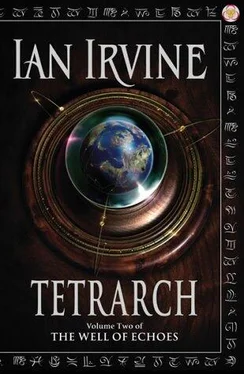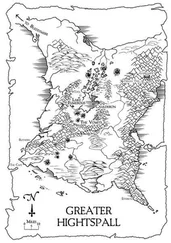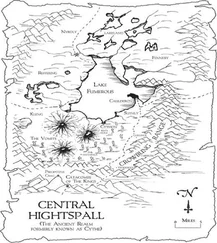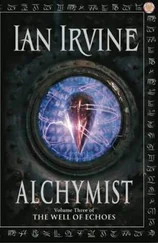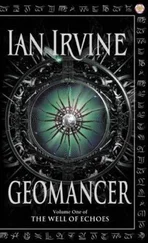A swooping suspended path of stone, the walkway curved along the outside wall of Nyriandiol, which itself swept in and out. At the far end, the path took a zigzag down and ran back the other way, and so on right down the eight levels of the monstrous building. The path had no steps and no rail. Its surface undulated like waves in the ocean. It was a colossal conceit and a dare, for there was nothing beneath it but the dull gleam of water hundreds of spans below, and to fall meant death. Many workers had died building the path; only one man dared to walk it.
Gilhaelith knew it like the most familiar parts of his body but every day it was a challenge that left his heart racing. Presently it was damp with condensed moisture from the lake, slippery in unexpected places, and if he relaxed it would claim him with profound indifference. Walking this path was a good way to start the day, or the night for that matter.
Safely at the lowest level, he grasped the handle of a door carved from solid red jasper and jerked it open. No need for locks here. The corridor was unlit. He made his way through the blackness to a small chamber, out through whose door yellow light streamed.
Mihail waited inside with breakfast – a platter of freshly salted slugs covered in foaming yellow slime. Gilhaelith downed the delicacies whole, two at a time, smacking his lips and licking the foam off his fingers. On each corner of the tray was a quartered, pickled red onion the size of a grapefruit, with which to cleanse his palate. Gilhaelith selected a quarter, inspected it, found a minute blemish and put it back. The others also failed his scrutiny; the whole sixteen quarters were blemished. Fortunately Mihail knew what to do. He deftly peeled the outer layer off the first quarter, presenting Gilhaelith with a perfect inner segment.
‘It’s too small,’ Gilhaelith said for the sake of form, but took the onion and crunched it noisily.
The servant presented a finger bowl half full of sulphur-water. Gilhaelith waggled his fingers in it, dried them on the proffered napkin and was ready for work.
‘You may go, Mihail.’
The servant withdrew. Gilhaelith took up the lantern and went through into the adjoining room, a chamber so vast that neither its ceiling nor far wall could be seen. He set the lantern on the floor, shuttered it completely and stood in the dark, listening.
The pipes were calling. He made out a low note, a fluttery tremble that he could feel through his slippers, and then a higher, eerie keening. Gilhaelith cocked his head. He had not heard either sound before and could not work out what their ultimate source might be.
Unshuttering the lantern, he made his way up the room. The light picked structures out of the gloom – pipes of wood and metal, most in clusters of four by four, rarely nine by nine. The values were important. He would have used larger numbers but Nyriandiol was not big enough to accommodate them. Some clusters were horizontal, though most stood upright. The end of the room was taken up by countless arrays of organ pipes, the tallest stretching up to the ceiling, which here stood the full eight storeys of Nyriandiol above them. Gilhaelith sat in a chair around which were clustered, in symmetrical arrays, more pipes of all sizes, down to ones smaller than a pencil.
The organ was a geomantic device designed to listen in to, and give sound to, the harmony of the spheres. So far, though he had spent a century refining it, Gilhaelith had been frustrated in that endeavour. The subtle vibrations of the planets in their orbits could not be detected by his geomancy, even funnelled through the largest pipes he could create. However, the organ did pick up other vibrations, other tones, and for more than fifty years he had been noting these and trying to discern the underlying patterns and the numbers behind them. Many vibrations seemed related to nodes or to their fields. Fields that in some cases were being drained dry by the power drawn by humanity’s squadrons of clankers, and other machines powered by the Secret Art. Another puzzle he was keen to solve.
Gilhaelith had constructed a model of the main nodes he knew about, trying but failing to understand them. His organ was powerful, for he drew upon the great Booreah Ngurle double node to drive it. But it, or perhaps he, lacked sensitivity. He could not tell how to overcome that.
There was something strange about the tones he was now hearing, and he needed to pinpoint them. On a bench across the room, on a pedestal of ebony wood, sat a perfect sphere some half a span across, surfaced with glass. The sphere contained a model of Santhenar, or at least the parts of it for which there were reliable maps. It showed Lauralin and the surrounding islands in detail, including the mountains in relief, though all of that lay beneath the smooth surface of glass.
Drawing on a pair of silken gloves, Gilhaelith passed his fingers over the surface of the geomantic globe, close but not touching. Wisps of cold vapour followed his movements: for sensitivity, the sphere had to be bitterly cold. It was kept that way by what lay at its core.
Beneath his hands, tiny pinpoints of light sparkled. He put on a pair of spectacles, each side of which contained a trio of lenses set within wire coils, like springs. Pulling down on the coils to separate the lenses, he squinted at the markings. With a grimace he lifted his hands and repeated the operation, no more successfully than the first time.
Gilhaelith returned to his chair, which stood in front of a curving console carved from a single block of cedar wood two spans across. It contained a number of organ keyboards whose yellow triangular keys alternately pointed toward him and away, as well as a variety of stops, buttons and pedals. Drawing out some stops and pushing in others, he set his big fingers to the keys and began to play, attempting to duplicate the low, fluttering tremble. He could not, which vexed him. Nor could he work out where the note came from, which bothered him even more. To unmask the source, he must first record the location on his scrying globe.
Gilhaelith was a geomancer of great power, though power itself held no interest for him. He cared about nothing except knowledge. He was wealthy, but likewise wealth had only one value – it allowed him to pursue his drive to understand geomancy in all its subtlety. Geomancy was the Art that underpinned the heavenly bodies and the forces that controlled them, and he sought to master it to the limit of his ability, though in truth he rarely used that power. When he did need to use the Art he relied on mathemancy, which he had developed and of which he was, as far as he was aware, the only practitioner in the world. Wielding an unknown Art had its advantages.
Neither could he precisely reproduce the higher sound that came from the pipes, though Gilhaelith had perfect pitch and knew which pipes made it. That irritated him even more. However, he was able to identify one remarkable feature of the call. It was moving .
That was strange. His organ could pick up the sounds associated with the great forces that shaped and moved the world, but they were always in the same place. It could not detect the harmonies associated with the planets, the moon, wandering comets or other celestial bodies. Occasionally a meteor might be large enough, and come close enough, for him to detect its song – a high squeal rising in pitch before abruptly being cut off – but neither of these sounds was remotely like that.
They were moving slowly. Definitely not a celestial body. A delicious puzzle. He enjoyed puzzles – Gilhaelith had been playing the world game for most of his adult life and was a long way from solving it. What could this object be? The organ was not sensitive to the tones from minor forces such as hedrons, clankers and other devices that employed the Art. He had no interest in the works of vulgar humanity. But this was different, and something in the notes was slightly, hauntingly familiar.
Читать дальше
